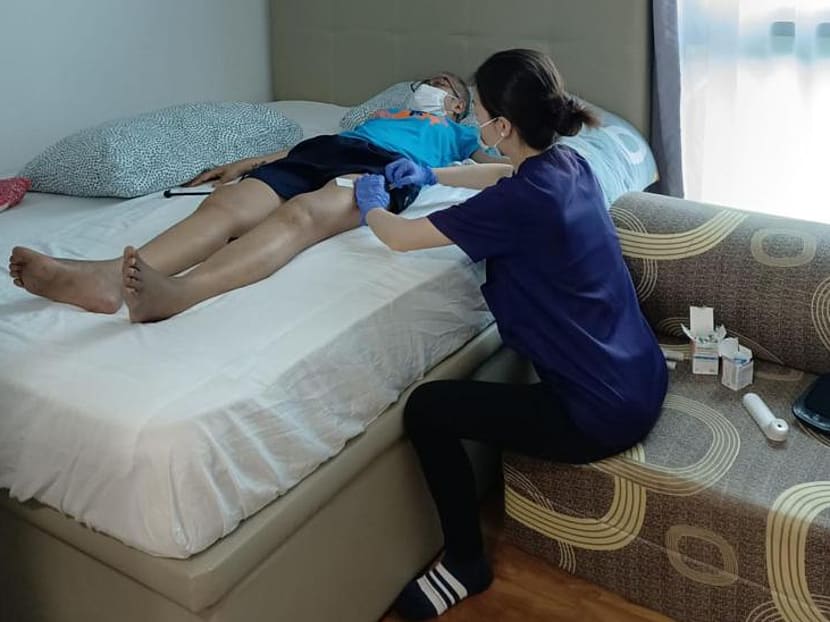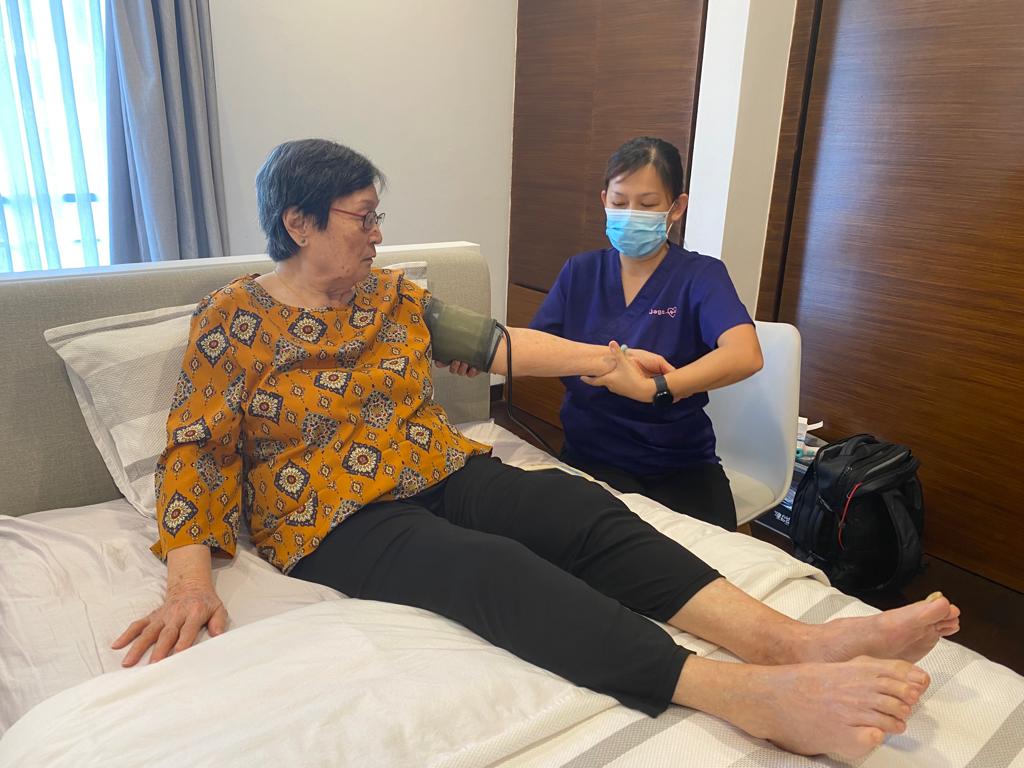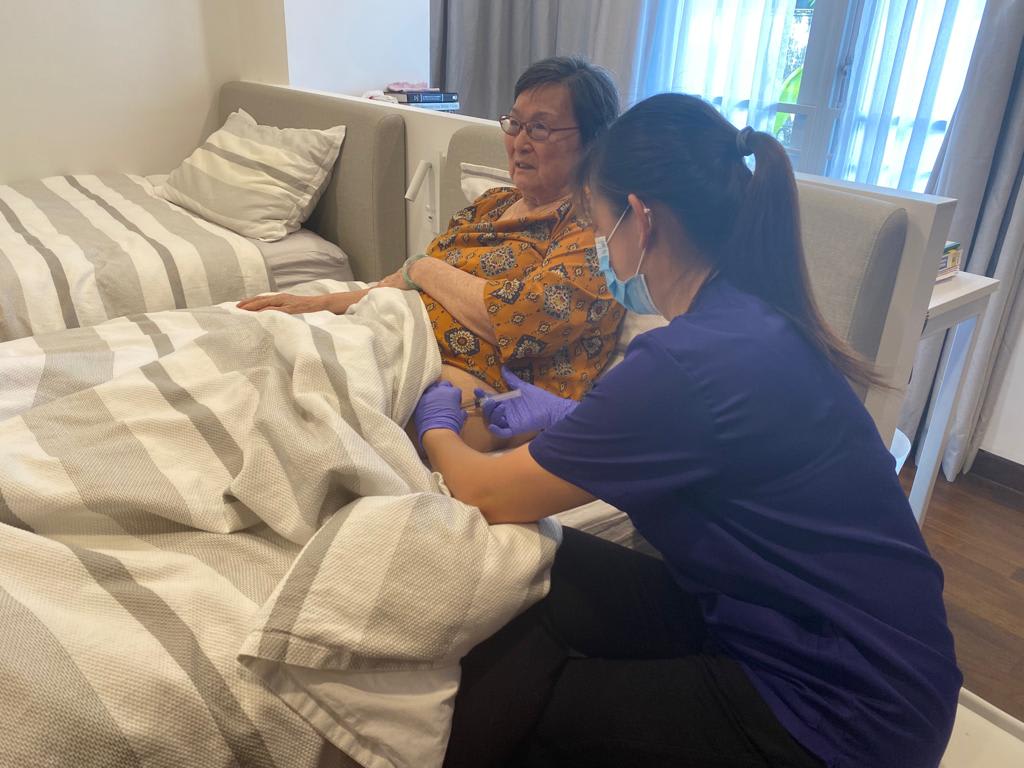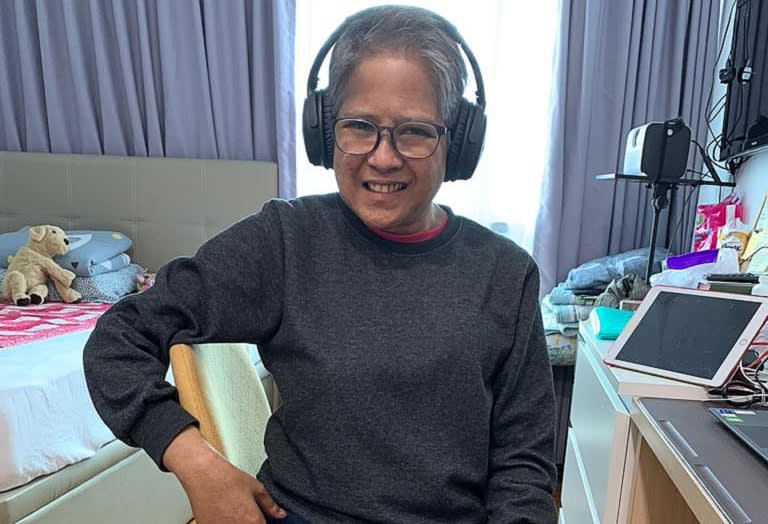Number of NCCS patients getting cancer treatment at home jumps 47 times over 18 months
SINGAPORE — Once every three weeks, Ms Arlene Cao, 47, sets some time aside during her lunch break for her cancer treatment.

Ms Arlene Cao (on bed) getting her routine treatment for breast cancer in her own home.
- Some patients with National Cancer Centre, Singapore get to have their treatments at home, reducing hospital visits
- The programme was planned before the Covid-19 pandemic for not-so-mobile patients but gained steam from 2020
- In the past 1.5 years, there has been a big jump in the number of patients receiving home treatment
- Most who have opted for the service said it is convenient and saves time
- A two-time breast cancer patient tells why she took it up and what it is like to receive treatment at home
SINGAPORE — Once every three weeks, Ms Arlene Cao, 47, sets some time aside during her lunch break for her cancer treatment.
Instead of jostling with the lunch crowd to get to the National Cancer Centre, Singapore (NCCS), she receives the treatments in the comfort and familiarity of her home.
A nurse would go to her home in Tampines to administer the injections and Ms Cao may choose to receive the treatment on her bed or in her favourite armchair.
The senior software engineer, who now works from home, told TODAY: “After taking my blood pressure, heart rate and temperature, the nurse would give me the injections and then take my vital signs again.
“After that, I can immediately go back to doing my work. To me, the best part about (receiving treatment at home) is the convenience and making fewer trips to the hospital.”
Ms Cao was diagnosed with Stage 2 breast cancer in 2018. She suffered a relapse of the disease last year and is now on targeted therapy.
Before the Covid-19 pandemic, receiving treatment at home for a serious disease such as cancer might have seemed like a far-fetched idea. Even if patients can afford private nursing care at home, they will still need to go to a medical centre or hospital for treatment if it does not offer home-based treatments.
Now, though, this form of cancer care model is a reality for more people in Singapore.
Under the Home Care Programme of NCCS, the home visit conducted by a nurse is free for patients on the programme because it is fully sponsored by grants from various pharmaceutical companies for now. That includes treatment-related consumables such as syringes, needles and alcohol wipes.
Dr Elaine Lim, senior consultant with NCCS’ division of medical oncology who initiated the programme, said that in the future, patients may need to pay for the home visit, but discussions with the relevant authorities here are underway for them to make payment claims for this service through the Central Provident Fund’s MediShield Life insurance scheme or as a deductible under Medisave, or both.
In Ms Cao’s case, for some example, the cancer drugs she takes cost her around S$2,000 for each session, but she does not have to pay for the cost of the home treatment service.
Since the programme started in July 2020, NCCS has seen a 47-fold increase in the number of patients receiving treatment at home — from seven patients in the first month of launch to 329 patients in January this year.
WHY PATIENTS TAKE UP TREATMENT AT HOME
Certain cancer treatments that may be given as injections are suitable for the home programme.
Dr Lim said that the centre had intended to extend its clinical service from the hospital to the community before Covid-19 struck, particularly for patients who were less mobile and required special arrangements such as an ambulance for their appointments.
“We were aiming for better access to care for patients, greater convenience and improved treatment compliance.”
However, several factors sped up the mobilisation of the home care programme during the pandemic. For example, physical distancing regulations that came into effect to reduce the number of people in hospitals.
Younger patients also chose to enrol in the programme because they wanted to avoid being exposed to the coronavirus, Dr Lim said.
Another factor is the development of cancer medicines that could be given to the patient through injections under the skin or into the muscle, instead of via intravenous infusions, she added.


Dr Lim said that for now, all NCCS patients are eligible as long as the patient’s treatment is suitable to be administered at home.
The treating doctor will assess and select suitable patients for home care and prescribe the treatment.
WHICH OTHER PLACES OFFER HOME TREATMENTS
Other than at NCCS, a home treatment programme for patients with myeloma to receive their chemotherapy injections is also available at the Singapore General Hospital. Myeloma is a type of blood cancer that develops from plasma cells in the bone marrow.
The National University Cancer Institute, Singapore (NCIS) also offers a home care programme to provide some cancer patients with accessible care and treatment outside of the hospital and in the patients’ homes.
Dr Lee Yee Mei, an advanced practice nurse and head of NCIS’ division of nursing oncology, said that under its programme, oncology-trained nurses provide services such as blood taking for blood tests, management of post-cancer therapy symptoms, wound care as well as selected chemotherapy and hormone therapies.
Dr Lee said that NCIS’ home care programme started in August 2015. However, the service was temporarily suspended due to resource constraints and restrictions in early 2020 when the coronavirus outbreak happened.
“We hope to resume the programme for select patients who need the service in the later half of this year.”
“There are no queues and the drugs are delivered to the patient’s home. The patient could be doing work or be tending to other matters during the home visit by the nurse.Dr Elaine Lim from the National Cancer Centre, Singapore, on the convenience of getting cancer treatment at home”
HOW IT SAVES TIME AND COST
Dr Lim of NCCS said that there has been positive feedback from patients on home treatment. Almost all (98 per cent) of patients surveyed said that they were satisfied with the service.
About seven in 10 patients preferred home care over treatment in the hospital, while about two in 10 were undecided.
Dr Lim said that some patients, especially the older ones, may prefer to still receive treatment at NCCS because it is “like an outing for them, where they can meet and interact with other patients as well as the staff”.
Reasons given by patients who preferred home care were convenience and time savings.
Dr Lim said: “Using subcutaneous Trastuzumab as an example, many HER2+ breast cancer patients are on this treatment for one year, once every three weeks, which translates to 18 treatment sessions a year.
“Patients would typically spend a few hours in NCCS for an injection. In addition to the time taken to administer the treatment, there would be time spent waiting in several patient touchpoints such as at the pharmacy to have prescription filled and at the procedure room.
“Other costs to the patient would be (two-way) transport expenses, the opportunity cost to the patient and caregiver taking leave from work, and for young families, the expense of arranging alternative childcare.”
On the other hand, for the home visits, they typically last about half an hour, including post-injection and monitoring time.
“There are no queues and the drugs are delivered to the patient’s home.
“The patient could be doing work — many of them work from home due to Covid-19 — or be tending to other matters during the home visit by the nurse,” Dr Lim added.
Receiving cancer treatment at home has some risks, but NCCS has safety measures in place.
“The risk is if the patient has a severe allergic reaction at home. However, this risk is low as patients receiving home care would have received at least one dose of the drug in NCCS and demonstrated no allergic reactions before enrolment into the home care programme,” Dr Lim explained.
All home care nurses are also trained in basic cardiac life support and are able to administer emergency care while waiting for an ambulance.
Doctors in nearby clinics may be contacted to help in an event of an emergency.
SECOND-TIME CANCER BATTLE
Ms Cao is from the Philippines and has been working in Singapore for around 16 years.

Her battle with breast cancer started in 2018 after she noticed lumps in her left breast. Life went back to normal after she underwent a mastectomy to remove the affected breast.
Then, last year, she started experiencing pain in her neck and back, and collapsed while crossing a road. Scans revealed that the cancer had returned and spread.
Ms Cao chose to be hospitalised for her cancer treatment from April to July last year because she was too ill and weak to look after herself at home. She was living alone.
The travel restrictions at the time due to the pandemic made it difficult for her family members to enter Singapore. The isolation took a toll on her.
“My best friend had also returned to the Philippines at the time. I was alone in the hospital. It was a hard time for me. I recall my brother telling me over a video call, to face (the cancer) and be brave,” she said.
Her brother, who lives in the United States, eventually got approval to come to Singapore to look after her. He hired a domestic worker to care for her before he returned to the US.
Ms Cao readily agreed to enrol in the NCCS programme because she felt that it would “make life easier” for her. The home treatments reduce the hassle and extra expenses of travelling to and from the hospital, especially on days when she feels more tired than usual.
“If I had to go down to the hospital for treatment, I’d have to take a Grab ride and that would be more money and time spent. I also feel that it is safer to get the injections at home than at the hospital (during the Covid-19 period),” she added.
She now goes to the hospital only for procedures or follow-up checkups.
Scans taken in January showed that her cancer has “almost cleared” after the treatments and she is on the road to recovery, Ms Cao said.
Not having to travel to the hospital regularly means that she may use the extra time to do the things she likes or to rest.
The avid runner, who used to compete in marathons, has been brisk-walking every day to build up her fitness and endurance. She hopes to resume running soon.
“As an athlete who is used to running marathons, I relied on my endurance (to overcome my cancer ordeal). I managed to face my health situation bravely,” she said.
“With prayers from my family and close friends, I survived — and now I’m here, breathing, walking, working and talking to you.”
WHO IS ELIGIBLE FOR NCCS' HOME CARE PROGRAMME
The Home Care Programme of the National Cancer Centre, Singapore (NCCS) was first piloted in July 2020 with seven breast cancer patients.
They were HER2-positive and were placed on subcutaneous (injections given under the skin) targeted therapy Trastuzumab.
HER2-positive breast cancer is a type of breast cancer that tests positive for a protein called human epidermal growth factor receptor 2.
Dr Elaine Lim, senior consultant with NCCS' division of medical oncology, said that the programme proved to be very popular, and a few months later, other drugs were included in the list of drugs that could be administered under it.
A larger group of patients are now eligible for the programme.
It is available for patients on:
- Targeted therapy Trastuzumab (Herceptin) and Pertuzumab+Trastuzumab (Phesgo), which are essentially breast cancer treatments
- Hormonal therapy (Goserelin, Leuprorelin, Degarelix, Fulvestrant), primarily for breast cancer and prostate cancer
- Immune boosters (granulocyte colony stimulating factor), for all cancer patients on chemotherapy regimens that induce low white blood cell counts
- Bone-modifying agents (Denosumab), which are mainly for patients with bone metastases or are on cancer medication that induce osteoporosis
“In the future, we hope to include intravenous administration of selected drugs — this is being explored. The limiting factors are the complexity of the process and the capacity of specialised nursing expertise,” Dr Lim added.









